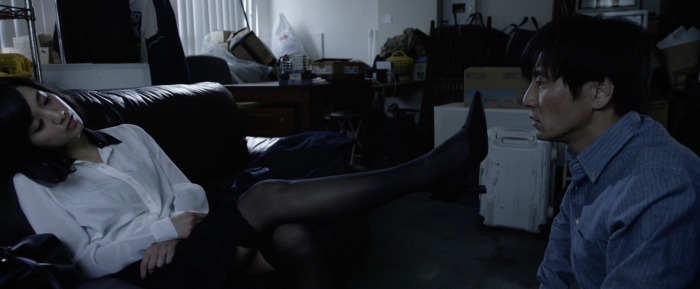Director: Eiji Uchida
Like Hitchcock’s Vertigo and Michael Powell’s Peeping Tom, Eiji Uchida’s Lowlife Love thrives on the psychosexual and metacinematic underpinnings of what some academic types might refer to as ‘the phallic gaze’. Its darkly comic vision of corruption and manipulation in Japan’s independent film industry is at its most richly compelling whenever the politics and passion of the business are blended seamlessly with the carnal desires of its characters to form a devious dissection of the (primarily male) ego. To fulfil their narcissistic needs in this industry, everyone is ‘screwing’ everyone in multiple senses of the word.
Just take has-been director Tetsuo (Kiyohiko Shibukawa), whose film career and sex life are inextricably entwined, epitomising the role of the camera as an instrument for fucking. Though this sympathetic slime-ball preaches artistic integrity over commercial success, one suspects sour grapes on his part, especially seeing how he has no qualms about making money in the porn industry with his assistant Mamoru (Yoshihiko Hosoda) – who tellingly specialises in POV sex films – while using his director status as a means of sleeping with women. A man whose domestic life is brimming with Freudian suggestions of sexual anxiety (after a night spent with two women, he wakes to the sight of his mother pointing a knife at him), he seems to finally get his filmmaking hard-on back when he meets aspiring actress Minami (Maya Okano).
‘Virginal’ in personality, and possibly in track record, Minami first meets Tetsuo when she signs up for the director’s extortionate and exploitative acting workshop. With a promising script from Minami’s classmate Ken (Shugo Oshinari), Tetsuo is set on casting her as the lead in his next film despite the objections of his contemporaries. Given the man’s sleazy history, however, it’s doubtful that his intentions are entirely pure. With Minami rejecting his sexual advances, the question is raised of whether Tetsuo regards the director’s lens as a potential cage to entrap his prized bird. That is to say, his film may be a means of both domination and presentation, capturing Minami’s youthful allure while showing it to the world as his own discovery.

Though Tetsuo’s actions are often contemptible, they’re hardly out of place in the engrossingly sordid ecosystem that Uchida creates. Amongst the eager, calculating upstarts and greedy, horny directors and producers that make up the scene (a typically charismatic Denden being a standout), seduction and business are one and the same. When a popular director sleeps with Minami before threatening to take both the star and Tetsuo’s film away from him (along with the gaze and power that they bring), it is an inspired moment of film industry cuckoldry that’s crushing in its multi-layered implications but exquisite in its execution.
Sadly, and somewhat ironically, Uchida’s intricate narrative of domination and emasculation climaxes prematurely, leaving much of the film’s final 40 minutes to Tetsuo’s sobering comedown as he learns to follow his heart instead of his dick and reconnects with the innocent passion that made him want to make films in the first place. While this concluding stretch certainly offers its share of sentimental charms, its simpler emotional palette pales in comparison to the devilish web of psychosexual tension that preceded it.
Still, given that Lowlife Love spends well over half its runtime gleefully evoking a biting pessimism towards love and filmmaking alike, it’s understandable that Uchida would want to take the time to affectionately remind us why he’s chosen to keep working in this industry regardless – and it’s a good thing he’s persisted too. Films about filmmaking rank among the biggest clichés of indie cinema but few in recent memory inspire the slow-forming grin that Lowlife Love earns at its macabre best.








